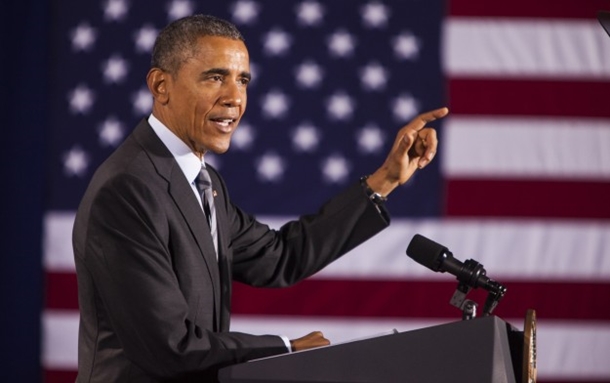 President Barack Obama said Thursday that the U.S. and its negotiating partners have reached an “historic” understanding with Iran about its nuclear program.
President Barack Obama said Thursday that the U.S. and its negotiating partners have reached an “historic” understanding with Iran about its nuclear program.
“Today, after many months of tough principle diplomacy, we have achieved the framework for that deal. And it is a good deal, a deal that meets our core objectives,” Obama said.
Obama spoke shortly after negotiators in Switzerland announced a general deal on Iran’s nuclear program.
Nothing is finalized until the deal is signed, but once completed, it “will make our country, our allies and our world safer,” Obama said. “If the framework leads to a final deal, it will make the U.S. and the world safer.”
According to Anadolu Agency, The agreement allows strong controls on Iran nuclear program for as much as 25 years, with severe limits during the first decade. Obama said the terms would now make Iran the “most inspected country in the world.”
“This deal is not based on trust, itis based on unprecedented verification,” said Obama, as Iran agreed to the most robust and intrusive inspections ever negotiated for any nuclear program.
He said some speculated that Iran would cheat and that the interim deal would fail. “Instead, it has succeeded exactly as intended. Iran has met all of its obligations,” Obama said.
Details of a final deal will be will be worked out in the next three months but the effects of the parameters that were agreed to Thursday will be felt immediately.
Spent fuel from nuclear facilities will be shipped out of Iran for the life of the reactor and Iran will not build a new heavy water reactor.
It effectively closes Iran’s path to a nuclear weapon using enriched uranium and prevents it from enriching uranium with its advanced centrifuges for at least the next 10 years.
It also requires Iran to neutralize the vast majority of its stockpile of enriched uranium.
Some experts argue that the republic is only two or three months from building a nuclear bomb, but “under this deal, Iran has agreed that it will not stockpile the materials needed to build a weapon,”Obama said, noting that the strict limitations on Iran’s stockpile will last for 15 years.
International inspectors will have unprecedented access not only to Iranian nuclear facilities, but to the entire supply chain that supports its nuclear program.
In exchange for agreeing to the deal, the international community has agreed to lift certain sanctions against Iran.
But the U.S. will continue to enforce other sanctions as they relate to human rights abuses and Iran’s ballistic missile program.
Obama said he would speak with Israeli Prime Minister Benjamin Netanyahu later Thursday to reassure him that “there is no daylight when it comes to our support for Israel’s security and our concerns about Iran’s destabilizing policies and threats towards Israel.”
He said he had spoken with King Salman of Saudi Arabia to assure him of the U.S.’s commitment to the security of its allies in the Gulf.
Obama assures allies about Irannuclear deal
President Barack Obama assured Middle East allies Thursday that progress on Iran’s nuclear talks wouldn’t diminish concerns about the republic.
After world powers and Iran reached a political framework for a comprehensive deal regarding Iran’s nuclear program, Obama called Israel’s Prime Minister Benjamin Netanyahu and Saudi King Salman bin Abdulaziz to discuss the deal.
Obama assured the leaders about the U.S.’s commitment to the concerns about “Iran’s destabilizing activities in the region” and its “threats towards Israel,” according to a White House statement.
Netanyahu has been one of the toughest critics of the Obama administration for conducting talks with Iran.
During an address to U.S. lawmakers last month Netanyahu claimed that Iran’s nuclear program was an immediate threat to Israel, and accused Obama of remaining indifferent to the threat.
Hours after the agreement was made public, Netanyahu threatened to take unilateral military action against Iran if he finds out that Iran is developing a nuclear weapon.
Obama has directed his national security team to increase consultations with the Israeli goverment to show a unified stand against the Iranian threat, the statement said.
Obama assured King Salman that in the months ahead the parties would finalize a comprehensive deal that will cut off Iran’s pathways to a bomb and verify the peaceful nature of Iran’s nuclear program.
Gulf countries are currently conducting a Saudi-led military campaign against Iranian-supported Houthi rebels in Yemen. The allies also perceive a threat by the Iranian nuclear program.
Obama invited the king and leaders of the Gulf Cooperation Council, or GCC, to his presidential retreat this spring to discuss the Iranian threat in the region.
The GCC is a political and economic partnership of Persian Gulf countries and includes Bahrain, Kuwait, Oman Qatar, Saudi Arabia and the United Arab Emirates.
[adrotate group=”14″] Netanyahu’s Residence Targeted in Another Attack
Netanyahu’s Residence Targeted in Another Attack Russia Halts Gas Supplies to Austria, Marking a Shift in European Energy Relations
Russia Halts Gas Supplies to Austria, Marking a Shift in European Energy Relations House of Representatives remains with the Republicans
House of Representatives remains with the Republicans Investigations against Martin Sellner
Investigations against Martin Sellner